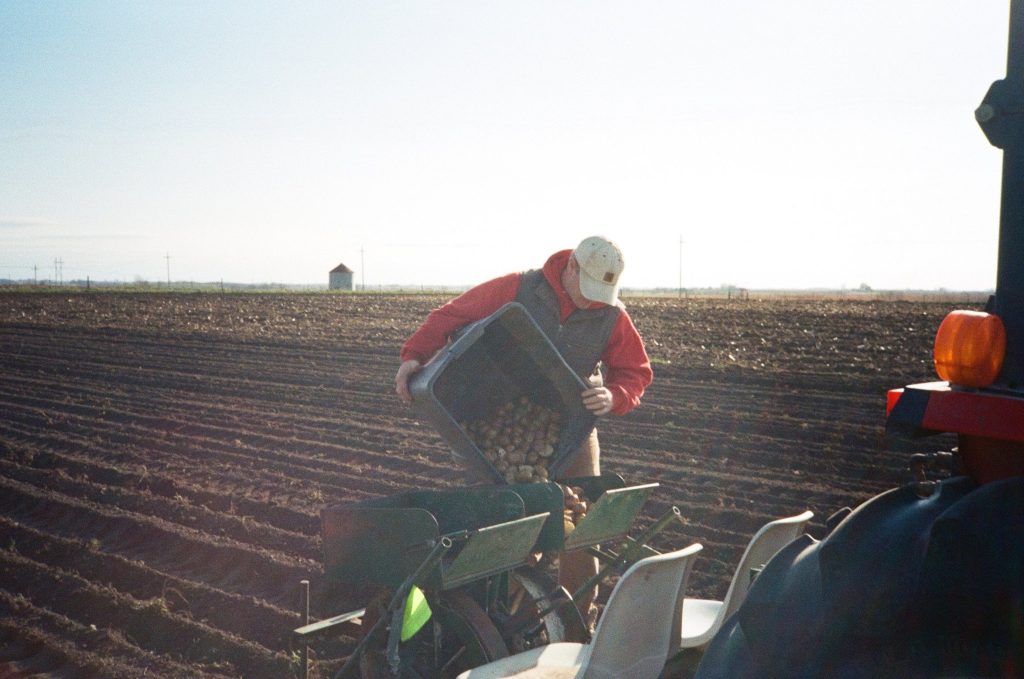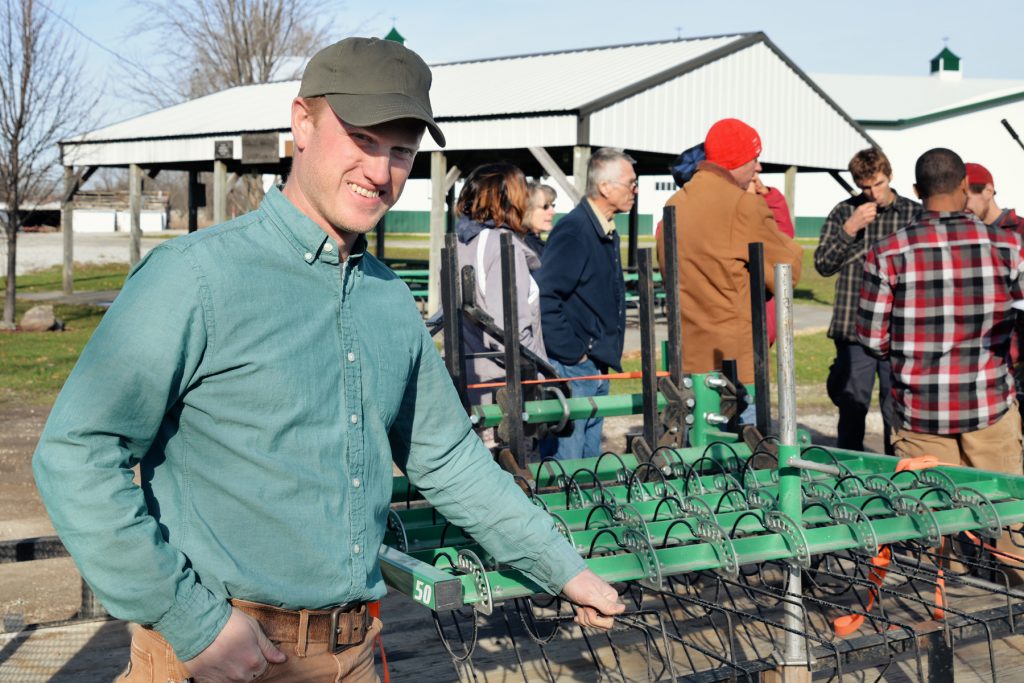Jason Grimm
Iowa’s tireless Farm to School architect
 TITLE: Farmer at Grimm Family Farms, and Food Systems Planner at Iowa Valley Resource & Conservation District
TITLE: Farmer at Grimm Family Farms, and Food Systems Planner at Iowa Valley Resource & Conservation District
LOCATION: Williamsburg, Iowa
IMPACT: Building up farm to school programs in nine Iowa counties!
Jason Grimm has about a thousand titles, but first and foremost, he is a third generation farmer in Iowa, where he raises corn, alfalfa, small grains, black beans, beef, poultry and a variety of produce.
Since 2009, however, Jason has also served as the Food Systems Planner for Iowa Valley Resource Conservation & Development in Cedar Rapids, where he connects farmers with schools looking to source local food for their students throughout a nine-county region. Jason works with local governments, health authorities, schools, farmers, non-profit organizations, food processors and others working to build a sustainable food system – so its no surprise that people say he knows everyone in the region!
“My experience as a farmer helped me bridge the gap between school food directors and farmers”
Wearing so many hats means Jason can fill a unique role in advancing farm to school programs in Iowa. Schools can be an unfamiliar market for many farmers, and understanding how they differ from their other customers is important. “My experience as a farmer helped me bridge the gap between school food directors and farmers,” he shares. For example, “[Farmers] weren’t familiar with how to respond back to the bids from schools. They ask me, ‘Can I just call and tell them that stuff?’ Not understanding the proper channels to navigate school contracts.”

Jason visits with students each year to teach them about food and farming. He takes extreme pride in annually providing 1,000 pounds of organic potatoes to the school he attended as a kid.
Jason was inspired, watching so many challenging interactions between farms and schools that he felt could be avoided. To help others navigate common roadblocks, Jason created the Iowa Farm to School Toolkit, complete with purchasing templates, sample checklists and other guides he hopes are useful for farmers and schools alike.
In fact, Jason seems to find practical solutions for all the curveballs that come with the development of new market structures. In rural areas like where Jason lives, schools often need a small amount of produce, which can be worth less to the farmer than the cost of transporting the food. Jason’s solution: working together. He manages the Iowa Valley Food Co-op , an online hub where farmers can pool their resources and defray costs associated with tapping into wholesale markets, in addition to reaching individual customers. The growing cooperative currently has 5 farms and serves as a food hub for a school district in the state. Jason views working collectively with other farmers as a strong strategy that benefits everyone.
A true renaissance man, Jason also leads beginning farmer and rancher trainings, facilitates food policy councils in Johnson and Linn counties, and helps develop regional farm to school chapters in Iowa.
But more than anything, Jason hopes that his work in Iowa will inspire others to get involved across the country.

Jason’s advice for farmers looking to tap into the growing farm to school market:
Working with Schools
- Schools can make great markets for farmers. Don’t underestimate how many schools are interested in purchasing locally – they may just need an extra push to get started.
- Convert pecks to pounds! Find common language with schools & be patient if you don’t initially understand each other.
- Be prepared for schools to ask you for special packaging or harvesting instructions. Schools also require different paperwork than other buyers. Seek guidance from a local farmer who has gone through the process before.
- Ask schools if they need a specific crop. Suggest starting with crops that require minimal processing or that can be stored through the winter.
Build Your Farm Business
- Look for cooperatives or food hubs to make logistics easier, help you grow sales, expand your customer base and build your brand. If you can’t find one nearby, create one with other local producers.
- Use your involvement with schools as a way to market your farm to local community members.
- Consider getting GAP (Good Agricultural Practices) certified. You may need to take classes about handling and liability, but it will open up new market opportunities for you.
Farm to School is More than Food
- Invite food service directors to tour your farm. It will strengthen your relationship and help them feel more comfortable buying from you.
- See if you can host students for a farm field trip or visit the classroom to teach them about farming.
Get Political
- Tell your senators to support bills that would help you get your products into schools.
- Connect with organizations that advocate on behalf of farmers. Jason suggests: National Farm to School Network, National Young Farmers Coalition, and National Sustainable Agriculture Coalition.
Resources for Farmers
Iowa Farm to School
Created by Iowa farmers for farmers everywhere who want to engage in farm to school programs.
Wisconsin Farm to School Toolkit for Farmers
Great list of tools and resources for farmers to engage in farm to school programs.
Bridging the Communications Gap
Planting a Farm to School Program
Tips for working with schools by Community Alliance with Family Farmers [PDF].
Click here to see a complete list of Farm to School resources.




